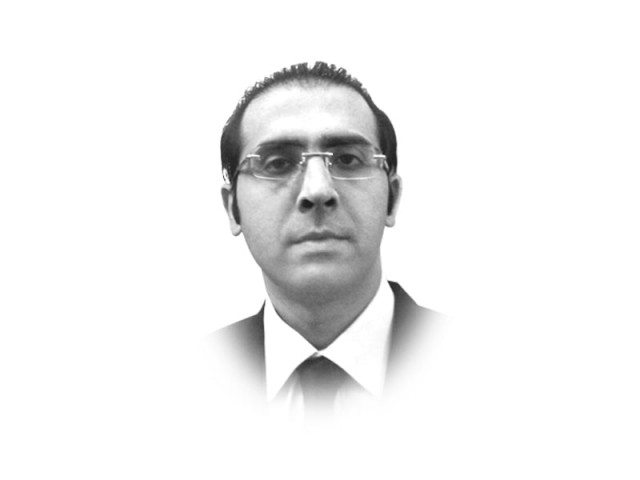Invisible Freedom
Amidst the invisible Namaloom Afrad in Karachi, only visible ones are prime time anchors and their terrified guests.

The writer is a lawyer and partner at Ijaz and Ijaz Co in Lahore
saroop.ijaz@tribune.com.pk
It should compel the revisiting of our assumption or cliché of the “free media”. The fact that the media has been unable to make these unknowns known, does not cover the media in very glowing light. One could say that everybody knows of them, hence there is little need to say it out aloud. In fact, it makes it more important to say it aloud. It has to be said that the Emperor has no clothes; in fact, it has been so long that we do not remember what the Emperor looked like with any clothes on. Perhaps, he never had any. Of course, it can rightly be said that it is a bit rich to say this, as they will not be named here either. This, unfortunately, seems to be the situation.
The media today is freer than it was yesterday and will probably (hopefully) be freer still tomorrow. Yet, it is sobering to see the prime time programme of Hamid Mir from Khuzdar, Balochistan, being blacked out and signals scrambled. No subtlety involved in the sabotage. The live programme of one of the most watched journalists in the country partially blacked out because he decided to talk about Balochistan and the role of the military/security agencies there. Mr Mir is fighting the good fight, showing exemplary courage in taking the military and intelligence agencies head-on. He deserves our respect and support. Yet, where is the outrage? Why have not logos turned black and our friend gentleman “Jeem” not broken into part melancholy and part revolutionary song? Where are “we will not be silenced” slogans from the journalist community, etc? Well, you know why. Imagine if such an attempt had been made by the civilian government.
This is not to suggest that we have not made progress. The ISPR is now occasionally forced into enough of a corner to issue a denial. The irritating euphemism Hassas Idaray is now increasingly dropped and replaced by the three alphabet acronym “ISI” (the example can maybe be replicated in the near future for Namaloom Afrad). It is also unfair to judge the media solely on the basis of prime time television anchors, yet they are the most visible representatives. The journalists in the trenches have and still put their lives in incredible danger to keep us informed. However, when one of them is martyred, apart from the organisation he/she worked for, no media outlet can even say proper words of condolences. The boilerplate report is, “A reporter from a niji (private) channel was murdered today”. Really, such is the misplaced competition that a rival channel/paper cannot be named even when a fellow colleague has been martyred. Many television channels still insist on not mentioning the minor fact that those killed in an attack were “Shia”, when they were only killed for being “Shia”.
Let me propose a small experiment for those of us who want to utilise leisure hours and inductive skills. If transcripts of all major prime time shows are handed out with names of anchors and guests blacked out, how many will be able to tell them apart. One would guess, not many. The same subject, same questions, the same answers and when identities revealed, probably the same guests. No one should suggest that our politicians should be let off the hook or not grilled; they deserve most of it. Yet that as a singular standard of freedom and courage is lazy and not completely honest. It is easier to be brave in the face of prime ministers and chief ministers as compared with certain captains of the industry and real estate wizards.
The level of investigative reporting in many cases is admirable; it is the scope of subjects that is a cause for concern. For example, not all brothers of people in power attract the same journalistic curiosity? Not all prodigal sons cause the same increase in blood pressure and heart rates? Where is the Pulitzer piece on DHAs? (Maybe all is well, that is why) It has caught no television anchor’s fancy to do a programme or series of programmes on if Saudi Arabia directly funds religious establishments in Pakistan and if so, why? No such reticence on the foreign policy front on Kerry-Lugar. The “missing” Baloch do not merit even the same attention as the foreign movie industry segment. Coming back to Khmer, to quote Michael Paterniti, during the regime there was a saying, “The people would caution a body was ‘fading away’. They would say ‘be careful or your body may disappear’.” On the comic front (it would be inaccurate to call it satire), in television the position remains the same. By a strange coincidence, no people in robes and uniforms make any appearance. What valour.
The suggestion is not that what they are doing is not worth doing; it most certainly is. Equally certainly, it is tunnel vision and not worthy alone of reminding us every evening of our debt to their courage. These are not simple harmless omissions. The deliberate refusal to see all this gives “them” time to breath, time to strengthen. Amidst the invisible Namaloom Afrad in Karachi, the invisible FC in Balochistan, the invisible ISI, the only visible ones are the prime time anchors and their same terrified mumbling guests. And frankly, it is getting tiring.
Published in The Express Tribune, March 10th, 2013.














COMMENTS
Comments are moderated and generally will be posted if they are on-topic and not abusive.
For more information, please see our Comments FAQ